
http://www.iaeme.com/IJM/index.as 112 editor@iaeme.com
International Journal of Management (IJM)
Volume 8, Issue 2, March – April 2017, pp.112–122, Article ID: IJM_08_02_013
Available online at
http://www.iaeme.com/ijm/issues.asp?JType=IJM&VType=8&IType=2
Journal Impact Factor (2016): 8.1920 (Calculated by GISI) www.jifactor.com
ISSN Print: 0976-6502 and ISSN Online: 0976-6510
© IAEME Publication
A STUDY ON STOCK EXCHANGES &
SUSTAINABLE DEVELOPMENT
P. Vijaya
Asst. Professor, Department of Business Management
RBVRR Women’s College, Narayanguda, Hyderabad, India
Dr. P. Sreenivas Reddy
Professor, Department of Business Management
Institution: Vignan University,
Vadlamudi, Guntur, India
ABSTRACT
Sustainability and Sustainable Development have emerged as the most important
goals of the world today. Sustainable development is development that meets the needs
of the present without compromising the ability of future generations to meet their own
needs. The Sustainable Development Goals (SDGs), otherwise known as the Global
Goals, are a universal call to action to end poverty, protect the planet and ensure that
all people enjoy peace and prosperity. These 17 Goals build on the successes of the
Millennium Development Goals, while including new areas such as climate change,
economic inequality, innovation, sustainable consumption, peace and justice, among
other priorities. They provide clear guidelines and targets for all countries to adopt in
accordance with their own priorities and the environmental challenges of the world at
large.
The overarching goal of sustainability has led to a growing pressure on nations and
various stakeholders in meeting the SDGs.
Stock Exchanges play a key role in determining the health of a business and
economy. They provide a central point for the interaction between investors, companies,
policymakers and regulators. The stock exchanges recognizing this have evolved to
meet the SDG’s through developing sustainability indices and incorporating
sustainability reporting and practices.
The Article aims at the study of the evolution of stock exchanges in the movement
towards sustainable development and the development of sustainable indices and
practices,
Key words: Sustainability, SDG, Sustainable Stock Exchange, Sustainable Index

A Study on Stock Exchanges & Sustainable Development
http://www.iaeme.com/IJM/index.as 113 editor@iaeme.com
Cite this Article: P. Vijaya and Dr. P. Sreenivas Reddy, A Study on Stock Exchanges
& Sustainable Development. International Journal of Management, 8(2), 2017, pp.
112–122. http://www.iaeme.com/IJM/issues.asp?JType=IJM&VType=8&IType=2
INTRODUCTION
"Stock exchanges are uniquely positioned at the intersection between investors, companies, and
regulators. As such they can play a key role in promoting responsible investment and
sustainable development."
- Mr. James Zhan
-
Director, Division on Investment and Enterprise, UNCTAD
-
2012 SSE Global Dialogue in Rio di Janiero, Braz
Stock exchanges provide a central point for the interaction between investors, companies,
policymakers and regulators. Exchanges have traditionally played a crucial role in building
transparent, regulated markets and promoting best practices in financial and corporate
governance disclosure among listed companies.
Today, exchanges are also well suited to help with the 21st century sustainable development
challenge. They are uniquely placed to facilitate action as regards sustainable business, with a
variety of measures at their disposal. These include listing requirements related to sustainability
reporting, voluntary initiatives, guidance documents and training for both companies and
investors, and sustainable investment products such as indexes that focus on ESG issues.
The diversity of stock exchanges around the world makes reviewing their sustainability
initiatives a challenge. Comparability is difficult due to wide differences in the regulatory
powers that exchanges possess, which can range from significant (comparable to securities
regulators) to moderate to non-existent.
In virtually all markets, however, exchanges maintain significant ‘soft-power’ in terms of
their ability to influence market participants through voluntary schemes. Exchanges have a
number of motivating factors for the promotion of sustainability reporting initiatives.
A 2013 survey of exchanges by EIRIS found that key motivations included:
• To improve the environmental, social and corporate governance performance of companies
listed on their exchanges.
• To encourage and to help investors engage with companies on sustainability issues.
• To identify themselves in the marketplace as committed to sustainability.
• To foster improved company performance, with the aim of promoting the sustainable long-term
viability of companies, and the market and stock exchanges themselves, and to that end an
interest in the latest research that explores links between long- term financial performance and
ESG issues.
Policymakers and regulators
The SSE’s 2012 Report on Progress noted that, in addition to the efforts taken by individual
stock exchanges to increase ESG disclosure among their listed companies, there is also a role
for regulators, governments and other actors in advancing ESG disclosure and reporting
requirements.
There is a recognized need for enhanced levels of corporate transparency on ESG, and
exchanges are well positioned in most jurisdictions to encourage and perhaps even require listed
companies to produce better sustainability information. But many exchanges in both developed
and developing countries require assistance with this effort.
A range of capital market stakeholders are increasingly recognizing the need for more
widespread and consistent ESG disclosure, and are looking to policymakers and regulators for

P. Vijaya and Dr. P. Sreenivas Reddy
http://www.iaeme.com/IJM/index.as 114 editor@iaeme.com
potential solutions. With more than a decade of voluntary initiatives and thousands of large
companies producing ESG reports, there is an increased focus on efforts to ensure that improved
sustainability performance percolates down from leading companies to the majority who are
yet to adopt ESG disclosure practices.
There are an estimated 80,000 transnational corporations in the world and yet there are only
about 5,000 to 10,000 companies producing ESG reports. There is also growing interest among
investors and other report users to ensure that reports are issued consistently and with
comparable information.
Stock exchanges themselves, especially large internationally competitive exchanges, are
expressing an interest in industry-wide solutions so as to avoid making ESG disclosure
something that could potentially affect the competitive position of first movers. In sum, there
is broad demand for the type of comprehensive approach traditionally offered by public policy.
The Report on Progress therefore provides a snapshot of what policymakers (represented by
G20 member States) and regulators (represented by IOSCO board members) are currently doing
in this area.
The G20 countries account for two-thirds of the world’s population, 85 per cent of its GDP
and 75 per cent of global trade (G20 2014). Its members therefore have the influence to lead
the way in ESG disclosure and reporting initiatives. The grouping also has the advantage of
including both developed and developing countries. IOSCO, meanwhile, is the global standards
setter for securities commissions and includes more than 120 securities regulators, who are
responsible for regulating more than 95 per cent of the world’s securities markets (IOSCO
2014). Securities commissions around the world are playing an increasing role in promoting
sustainability disclosure. IOSCO therefore could be well placed to provide leadership in this
area.
There is a growing discussion of sustainability and ESG disclosure requirements at the
international level. This is reflected in the growth of the SSE initiative in terms of the number
of partner stock exchanges and the extent of its engagement activities with other actors in this
space such as investors, the private sector, and regulators and policymakers. It is also reflected
in recent developments at the World Federation of Exchanges (WFE) with its Sustainability
Working Group, and the International Integrated Reporting Council (IIRC) with its Corporate
Reporting Dialogue.
Stock exchange initiatives
The report looked at 55 stock exchanges around the world (Table 2.1), including the members
of the World Federation of Exchanges (WFE) (excluding those focused primarily on futures
and options) as well as SSE partner exchanges that are not members of the WFE. Combined,
these exchanges host more than 45,000 companies with over $65 trillion in market
capitalisation.
This analysis nearly doubles the number of stock exchanges reviewed in the 2012 Report
on Progress and is intended to provide a snapshot of the exchanges’ efforts towards introducing
sustainability measures and products.
Sustainability indices
Sustainability indices remain the most popular type of sustainability initiative among stock
exchanges, with 23 of the 55 exchanges offering at least one index integrating social and/or
environmental issues.
Two exchanges reviewed in the 2012 Report on Progress have since added sustainability
indices: the Shenzhen Stock Exchange and SIX Swiss Exchange. Training and guidance can

A Study on Stock Exchanges & Sustainable Development
http://www.iaeme.com/IJM/index.as 115 editor@iaeme.com
help prompt the integration of sustainability information in investment decision making by
offering guidance documents and formal training to their listed companies and investors.
Over a third of the exchanges reviewed provide either guidance or training to the listed
companies on their exchange. Of these, three also provide guidance documents to investors,
and four provide investor training on the need to integrate sustainability into investment
decisions.
Sustainability reporting
Of the 55 exchanges reviewed, seven require some environmental and social reporting for all
their listed companies, while an additional five exchanges require such reporting for companies
of a specific size or within a specific industry.
In addition to these twelve exchanges, three others make strong recommendations to
disclose such information and, in some cases, provide or refer to specific sustainability report
guidance. In all, over a quarter of the exchanges reviewed either requires or recommends some
environmental and social reporting for companies listed on their exchange.
As many as 21 stock exchanges across the world could introduce sustainability reporting
standards in the coming months. They would join the 17 exchanges that currently recommend
listed companies to report on environmental, social and governance (ESG) issues — going a
step further by providing model guidance to participating companies.
These exchanges have pledged to list their guidance on the Sustainability Stock
Exchanges (SSE) initiative. It's a peer-to-peer platform that invites global exchanges to promote
ESG disclosure among listed companies and among each other. SSE includes over 60
exchanges — representing more than 70 percent of listed equity markets — and more than
30,000 companies with a market capitalization over $55 trillion.
"Sustainability reporting has come of age", said James Zhan, director of the division on
Investment and Enterprise at the U.N. Conference on Trade and Development (UNCTAD),
which works on trade, investment, finance and technology issues in developing countries.
Companies are demanding sustainability guidelines outside of the top-down push from
government agencies and NGOs, he added.

P. Vijaya and Dr. P. Sreenivas Reddy
http://www.iaeme.com/IJM/index.as 116 editor@iaeme.com
The 21 exchanges "have confirmed to us they will introduce new guidelines either this year
or within the first quarter of next year, and we know that many of them are close because they
have posted draft guidelines on their websites for comment and discussion", Zhan's statement
detailed.
By reporting on sustainability issues, companies tend to act more sustainably, Zhan said,
explaining the incentive of a positive correlation between strong sustainable performance and
financial performance. The private sector is critical for achieving the UN Sustainable
Development Goals, and involving stock exchanges could mobilize thousands of private
companies to move forward.
After all, stock exchanges enable businesses to create value and jobs. They set the pace for
corporate growth, but growth left unguided can kindle an unsustainable hunger for quick profits.
At the same time, stock exchanges are responsive to market demand, political shifts and the
cultures in which businesses operate. The market reflects when companies offer innovative
products, better practices and transparent data, encouraging other organizations to follow.
Launched in 2009 by UN secretary-general Ban Ki-Moon, the SSE is a joint effort of the
UNCTAD collaborated with the UNCTAD Investments and Enterprise Division, the UN
Global Compact, the United Nations Environment Programmes Finance Initiative and
the Principles for Responsible Investment (all organizations dedicated to the advancement of
ethical, environmentally and socially sound business growth).
The 21 stock exchanges pledged to list their guidance on the Sustainability Stock Exchanges
(SSE) initiative, a peer-to-peer platform that invites global exchanges to promote ESG
disclosure among listed companies and among each other.
The benefits of breaking barriers
There has long been a call for bridging the barrier between sustainability and investor relations.
A recent report by Sustainability, Closing the Sustainability-Investor Relations Gap, makes the
case for stronger internal engagement between sustainability and investor relations
departments.
It outlines five points of misalignment between sustainability strategy and IR teams:
1. Differing language used to describe and measure company performance.
2. Investors desiring short-term results while sustainability teams focus on issues that play out over
the medium- to long-term.
3. Inadequate mutual comprehension and technical capacity in the respective disciplines of IR and
sustainability.
4. Lack of strong relationships between IR and sustainability team members
5. Not enough staff or resources to integrate sustainability data to investor communications.
Yet healing this divide benefits all parties and boosts profits, Sustainability says. And robust
ESG reporting would attract new long-term investors seeking deeper business risk and
opportunity analysis and who want to understand the business’s social and environmental
context. Plus, sustainability teams with a good knowledge of investor needs would tailor their
reporting to be more relevant and clearly communicate the financial value of their efforts.
A company would gain greater trust and credibility with investors, as well as reduce the
effort and time needed to respond to investor surveys and ad-hoc inquiries relating to
sustainability.
Furthermore, according to Sustainability, “Stock exchanges and other governing bodies are
increasingly making changes to their requirements for corporate disclosure on these issues.”




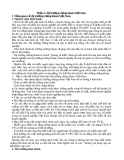
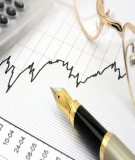
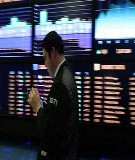




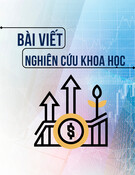

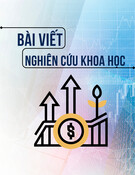
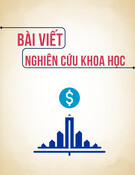





![Đề thi Tài chính cá nhân kết thúc học phần: Tổng hợp [Năm]](https://cdn.tailieu.vn/images/document/thumbnail/2025/20251015/dilysstran/135x160/64111760499392.jpg)


![Câu hỏi trắc nghiệm và bài tập Thị trường chứng khoán [mới nhất]](https://cdn.tailieu.vn/images/document/thumbnail/2025/20251001/kimphuong1001/135x160/75961759303872.jpg)


